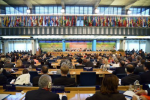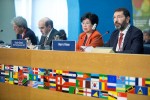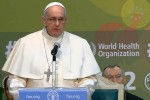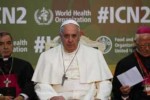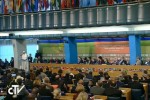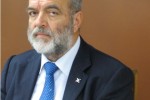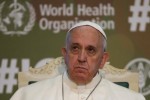2014 (EN)
20 November 2014
Tutte le Attività (EN) -
Anno 2014

It took place in Rome in the headquarter of FAO the second “International conference on malnutrition”.
Especially noteworthy the speech of Pope Francis:
"It is really frustrating to realize how the struggle against hunger and malnutrition is obstructed by market priorities and pre-eminence of profits, which reduced food to a common staff, subject to speculation, also financial speculation".
He started in this way His speech, interrupted several times by the thunderous applauses by dignitaries from all over the world.
The Pope arrived in the headquarter of Onu Ministry in Roma before 11:00. At the third floor of the building, before to enter in the Conference Hall the Pope met the Spanish Queen who had yet finished her participation, introduced by greetings by Agricultural, Food and Forestry Policies Minister Maurizio Martina, president of the Conference, and by the introduction of Josè Graziano da Silva, general director of Fao.
The entrance of Pope Jorge Mario Bergoglio, followed by General Cardinal Pietro Parolin, had been welcomed by the standing ovation of the attendants to the meeting. The Pope addressed to the assembly in Spanish.
"Nowadays we are talking so much about rights, often forgetting about duties- He stated- Maybe we don’t think so much about those who are suffer the hunger. And when we are talking about new rights, we are not taking in account the hunger man over there, at the corner of the street, who asks for the right to live, to be taken in the account in his condition, to have a basic alimentation.
He asks us dignity, not handout. So,- kept on the Pope – the challenge to be faced is the absence of solidarity. Our societies are characterized by growing individualism and division. That’s lead to deprive poor people of life right and to arouse revolts against institutions.
The president of Fondazione Mediterraneo Michele Capasso highlighted the spreading of “ legal criminality”: those action which, under the legality sphere, take resources to direct intervents in some sectors: from excessive administrative costs of institutions to the not equal distribution of available resources.










